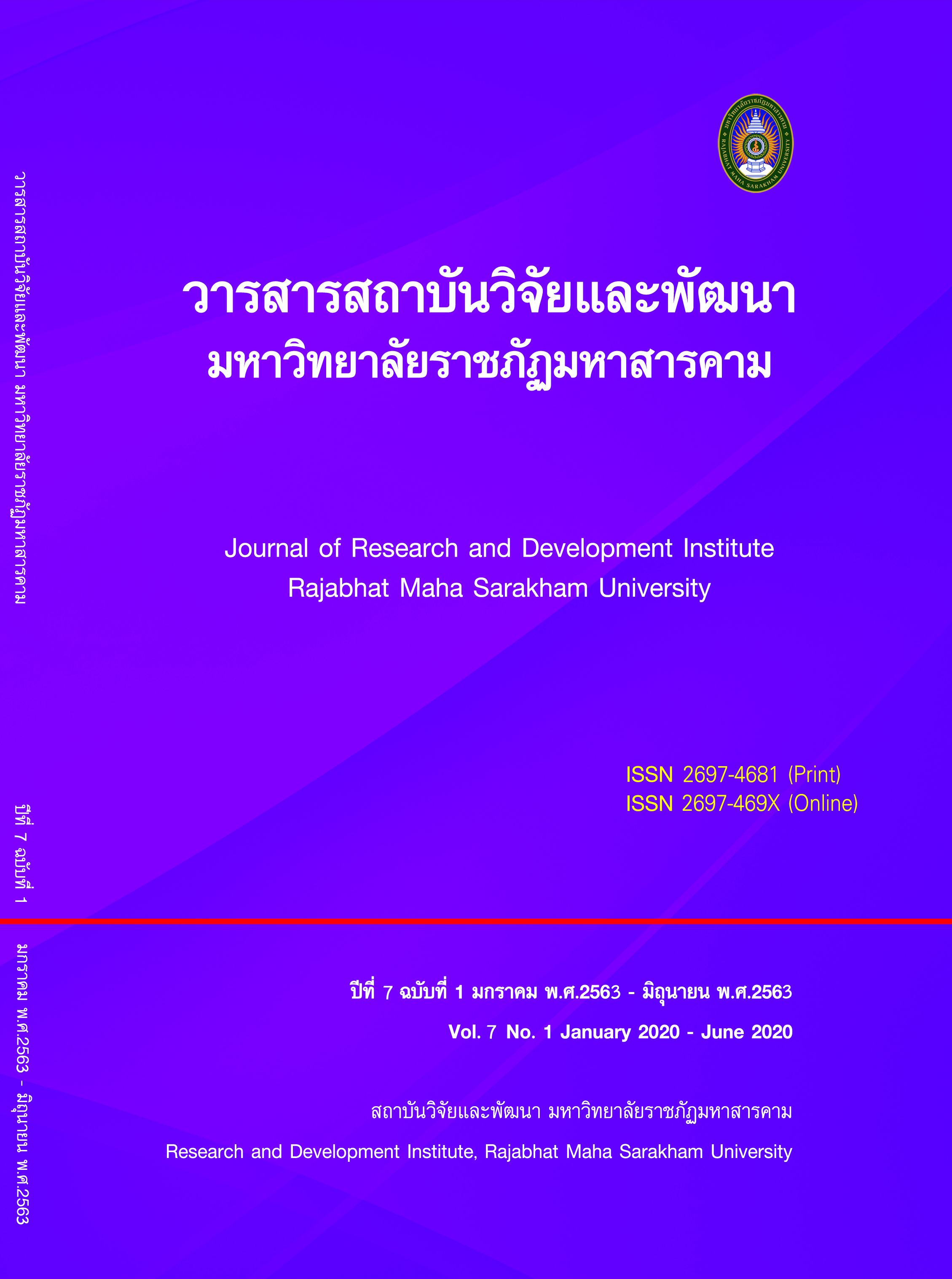The Effect of the Instruction by Project Based Learning (PBL) on the Student’s Achievement in Science Subject and Problem-Solving ability of Secondary School Students
Keywords:
Project-based Learning Management, Science Learning Achievement, Problem Solving AbilityAbstract
The purposes of this research were to 1) compare achievement in learning science subject between experimental group and control group 2) compare achievement in learning science subject between pretest and posttest of experimental group 3) compare problem solving ability between experimental group and control group 4) compare problem solving ability between pretest and posttest of experimental group. The samples were 77 Mathayomsuksa two students Boonkumrachbamrung school, Pathum Thani, selected by simple random sampling. The samples were divided into two groups; the experimental group used the instruction by Project Based Learning (PBL) and the control group was taught using conventional approach. The research instruments were 1) lesson plans on teaching science by PBL in structure of the Earth topic 2) an achievement test in structure of the Earth topic, included 20 items with the reliability = 0.84, the item discrimination = 0.21-0.97, and the item difficulty = 0.2-0.76 3) a test of problem solving ability, included 20 items with the reliability = 0.70, the item discrimination = 0.21-0.79, and the item difficulty = 0.22-0.77.
The research results were as follows: (1) After the experiment, achievement in learning science subject of the experimental group and the control group were significantly different at the statistical level of.05. (2) After the experiment, the experimental group had the achievement in learning science subject higher than before the experiment at the statistical level of.05. (3) After the experiment, problem solving ability of the experimental group and the control group were significantly different at the statistical level of.05. and (4) After the experiment, the experimental group had the problem-solving ability higher than before the experiment at the statistical level of.05.
References
References
Anchali Thongaime (2018). “PROJECT-BASED LEARNING FOR DEVELOPING STUDENT IN THE 21st CENTURY”. Valaya Alongkorn Review (Humanities and Social Science), 8 (3): 185-199. [In Thai].
Choosri Wongratana and Ong-art Naiyapatana. (2008). Experimental research design and statistics: basic concepts and methods. Bangkok: Chulalongkorn University. [In Thai].
Howard (2018). “Twenty-First Century Learning as a Radical Re-Thinking of Education in the Service of Life”. Education Science Sydney, 8 (189): 2018
Lutfee Dawloh (2016). Effect of Project-Based Learning on Biology Achievement, Scientific Process Skills, and Attitude towards Science of Grade 11 Students. Thesis of Master of Education in Teaching Science and Mathematics Prince of Songkla University. [In Thai].
Maythawee Soranet (2017). “PROJECT-BASED LEARNING MANAGEMENT TO DEVELOP COMPUTER LEARNING ACHIEVEMENT AND PROJECT WORK ABILITIES FOR MATTHAYOMSUKSA III STUDENTS”. Journal of Education and Social Development, 13 (1): July - December 2017. [In Thai].
OECD. (2012). PISA 2012 Results in Focus. (2016, November 1). Retrieved from.
Pellengrio and Hilton (2009). Education for Life and Work: Developing Transferable Knowledge and Skills in the 21st Century. The National Academies Press. Washington.
Pimpan Dachakupt and Payao Yindeesuk (2016). Teaching children to do project work: teach teachers to do operational research in the classroom. Bangkok: Chulalongkorn University. [In Thai].
Rosnapa Rasu (2016). The Development of Instructional Package by Using Project-Based Learning on Biomolecules for Mathayomsuksa 4 Students. Master of Education Independent Study (Educational Management): Naresuan University. [In Thai].
Supamas Tientong (2010). The Development of Problem Solving Abilities of Fifth Grade Student Taught by Problem-based Learning Approach. Master's thesis (Curriculum and Supervision): Silpakorn University. [In Thai].
Tamba, Motlan, and Turnip (2017). “The Effect of Project-Based Learning Model for Students’ Creative Thinking Skills and Problem Solving”. IOSR Journal of Research & Method in Education, 7 (5): September–October, p 67-70.
Trop, L., & Stage. (2002). Problems as possibilities: Problem-based learning for K-12 education. Alexandria, VA: Association for Supervision and Curriculum Development.
Wathna Soonthorndhai. (2004). Study statistics with SPSS: Research Tools Sector Analysis and Test analysis. Bangkok: June Publishing. [In Thai].
Wattana Makkasman. (1996). The development of a project-based instructional model for enhancing the self-esteem of kindergarteners. Master of Education Thesis (Early Childhood Education): Chulalongkorn University. [In Thai].
Downloads
Published
How to Cite
Issue
Section
License
Articles that are published are copyrighted by the authors of the articles







